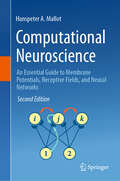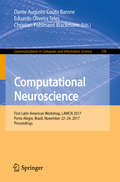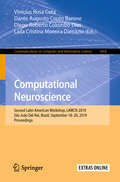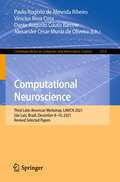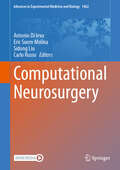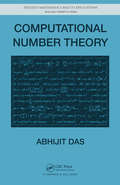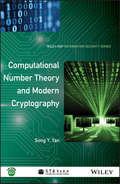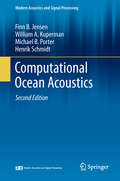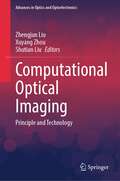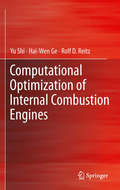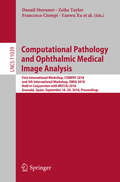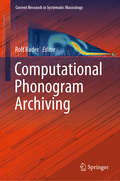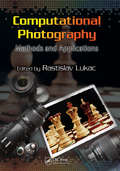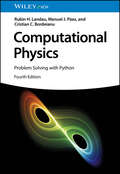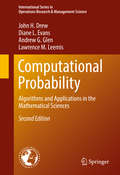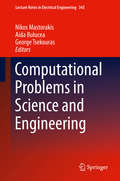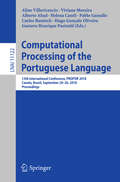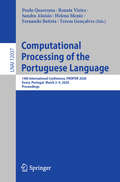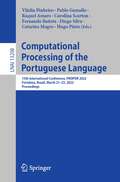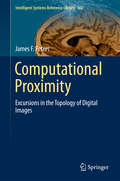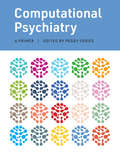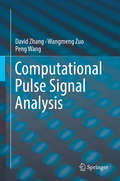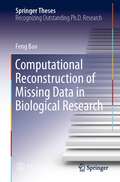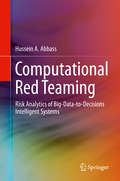- Table View
- List View
Computational Neuroscience: An Essential Guide to Membrane Potentials, Receptive Fields, and Neural Networks
by Hanspeter A. MallotThis book provides an essential introduction to modeling the nervous system at various levels. Readers will learn about the intricate mechanisms of neural activity, receptive fields, neural networks, and information coding. The chapters cover topics such as membrane potentials, the Hodgkin-Huxley theory, receptive fields and their specificity for important stimulus dimensions, Fourier analysis for neuroscientists, pattern recognition and self-organization in neural networks, and the structure of neural representations. The second edition includes revised text and figures for improved readability and completeness. Key points are highlighted throughout to help readers keep track of central ideas. Researchers in the field of neuroscience with backgrounds in biology, psychology, or medicine will find this book particularly beneficial. It is also an invaluable reference for all neuroscientists who use computational methods in their daily work. Whether you are a theoretical scientist approaching the field or an experienced practitioner seeking to deepen your understanding, "Computational Neuroscience - An Essential Guide to Membrane Potentials, Receptive Fields, and Neural Networks" offers a comprehensive guide to mastering the fundamentals of this dynamic discipline.
Computational Neuroscience: First Latin American Workshop, LAWCN 2017, Porto Alegre, Brazil, November 22–24, 2017, Proceedings (Communications in Computer and Information Science #720)
by Dante Augusto Couto Barone Eduardo Oliveira Teles Christian Puhlmann BrackmannThis book constitutes the thoroughly refereed proceedings of the First International Workshop of Computational Neuroscience, held in Porto Allegre, Brazil, in November 2017. The 12 full papers and 3 short papers presented have been thoroughly reviewed andselected from 40 submissions. The papers are organized in topical sections: neural networks; artificial intelligence; computer vision; machine learning; graphic systems and interfaces; decision trees; nonlinear equations; nano-electromechanical systems.
Computational Neuroscience: Second Latin American Workshop, LAWCN 2019, São João Del-Rei, Brazil, September 18–20, 2019, Proceedings (Communications in Computer and Information Science #1068)
by Dante Augusto Couto Barone Vinícius Rosa Cota Diego Roberto Colombo Dias Laila Cristina Moreira DamázioThis book constitutes the thoroughly refereed proceedings of the Second International Workshop of Computational Neuroscience, held in São João Del-Rei, Brazil, in September 2019. The 17 full papers and 3 short papers presented have been thoroughly reviewed and selected from 45 submissions. The papers are organized in topical sections: artificial intelligence, machine learning, and related topics; complex systems and complex networks; computational neuroscience of learning and memory; neural signal processing; software and hardware implementations in neuroscience; brain-machine interfaces and neurostimulation; and seizure prediction.
Computational Neuroscience: Third Latin American Workshop, LAWCN 2021, São Luís, Brazil, December 8–10, 2021, Revised Selected Papers (Communications in Computer and Information Science #1519)
by Dante Augusto Couto Barone Vinícius Rosa Cota Paulo Rogério de Almeida Ribeiro Alexandre César Muniz de OliveiraThis book constitutes the refereed proceedings of the Third Latin American Workshop, LAWCN 2021, held in Sao Luis do Maranhao, Brazil, during December 8–10, 2021.The 13 full papers and 3 short papers included in this book were carefully reviewed and selected from 27 submissions. They were organized in topical sections as follows: Interdisciplinary applications of Artificial Intelligence (AI) and Machine Learning (ML); AI and ML applied to robotics; AI and ML applied to biomedical sciences; Health issues and computational neuroscience; Software and hardware implementations in neuroscience; and Neuroengineering – science and technology.
Computational Neurosurgery (Advances in Experimental Medicine and Biology #1462)
by Carlo Russo Antonio Di Ieva Sidong Liu Eric Suero MolinaThis comprehensive and authoritative reference presents the state-of-the-art computational methods applied to the field of neurosurgery. The book brings together leading neuroscientists, neurosurgeons, mathematicians, computer scientists, engineers, ethicists and lawyers, to open the new frontier of computational neurosurgery to a broad audience interested in the translational field of the application of computational models, such as deep learning, to the study of the brain and the practical applications of neurosurgery. The focus is primarily clinical, and there is a solid foundation of research aspects. With forewords by Michael L.J. Apuzzo and Enrico Coiera, the book is organized into 2 sections: (1) tenets of computational modeling, artificial intelligence, computational analysis, and analysis software; (2) computational neurosurgery applications, including neurodiagnostics, neuro-oncology, vascular neurosurgery, all the neurosurgical disciplines, surgical approaches, intraoperative applications, and ethics and legal aspects.
Computational Number Theory (Discrete Mathematics and Its Applications)
by Abhijit DasDeveloped from the author's popular graduate-level course, Computational Number Theory presents a complete treatment of number-theoretic algorithms. Avoiding advanced algebra, this self-contained text is designed for advanced undergraduate and beginning graduate students in engineering. It is also suitable for researchers new to the field and pract
Computational Number Theory and Modern Cryptography (Wiley-hep Information Security Ser.)
by Song Y. YanThe only book to provide a unified view of the interplay between computational number theory and cryptography Computational number theory and modern cryptography are two of the most important and fundamental research fields in information security. In this book, Song Y. Yang combines knowledge of these two critical fields, providing a unified view of the relationships between computational number theory and cryptography. The author takes an innovative approach, presenting mathematical ideas first, thereupon treating cryptography as an immediate application of the mathematical concepts. The book also presents topics from number theory, which are relevant for applications in public-key cryptography, as well as modern topics, such as coding and lattice based cryptography for post-quantum cryptography. The author further covers the current research and applications for common cryptographic algorithms, describing the mathematical problems behind these applications in a manner accessible to computer scientists and engineers. Makes mathematical problems accessible to computer scientists and engineers by showing their immediate application Presents topics from number theory relevant for public-key cryptography applications Covers modern topics such as coding and lattice based cryptography for post-quantum cryptography Starts with the basics, then goes into applications and areas of active research Geared at a global audience; classroom tested in North America, Europe, and Asia Incudes exercises in every chapter Instructor resources available on the book’s Companion Website Computational Number Theory and Modern Cryptography is ideal for graduate and advanced undergraduate students in computer science, communications engineering, cryptography and mathematics. Computer scientists, practicing cryptographers, and other professionals involved in various security schemes will also find this book to be a helpful reference.
Computational Ocean Acoustics (Modern Acoustics and Signal Processing)
by Henrik Schmidt Michael B. Porter Finn B. Jensen William A. KupermanSenior level/graduate level text/reference presenting state-of-the- art numerical techniques to solve the wave equation in heterogeneous fluid-solid media. Numerical models have become standard research tools in acoustic laboratories, and thus computational acoustics is becoming an increasingly important branch of ocean acoustic science. The first edition of this successful book, written by the recognized leaders of the field, was the first to present a comprehensive and modern introduction to computational ocean acoustics accessible to students. This revision, with 100 additional pages, completely updates the material in the first edition and includes new models based on current research. It includes problems and solutions in every chapter, making the book more useful in teaching (the first edition had a separate solutions manual). The book is intended for graduate and advanced undergraduate students of acoustics, geology and geophysics, applied mathematics, ocean engineering or as a reference in computational methods courses, as well as professionals in these fields, particularly those working in government (especially Navy) and industry labs engaged in the development or use of propagating models.
Computational Optical Imaging: Principle and Technology (Advances in Optics and Optoelectronics)
by Zhengjun Liu Xuyang Zhou Shutian LiuThis book highlights a comprehensive introduction to the principles and calculation methods of computational optical imaging. Integrating optical imaging and computing technology to achieve significant performance improvements, computational optical imaging has become an active research field in optics. It has given rise to the emerging of new concepts such as computational imaging, computational measurement and computational photography. As high-performance image detectors make image measurements discrete and digital, images are mostly recorded in the form of discrete data, almost replacing the continuous medium used for pattern recording. Computational optical imaging technology has become an effective way for people to study microscopic imaging. At present, different imaging systems are composed of continuous optical elements such as lenses and prisms or discrete optical elements such as spatial light modulators or digital micro-mirror devices. The current computing technology has permeated all aspects of imaging systems and gradually promotes the digitization of optical imaging systems. This book summarizes the representative work done in this field and introduces the latest results. Computing technology plays an important bridging role between theories of optics and experimental systems, which inspires more comprehensive and in-depth research. It has the advantages of high repeatability, flexibility, strong computing power and low cost. In this multidisciplinary field, researchers in computer science, optics and information science have joined together to extend its depth and breadth. Targeting cutting-edge issues to be solved in computational optics, this book introduces a variety of methods that involve theoretical innovations and technical breakthroughs in imaging resolution, the field of view, imaging speed, and computing speed. It intends to provide a handy reference and technical support for graduate students, researchers and professionals engaged in the study and practice of computational optical imaging.
Computational Optimization of Internal Combustion Engines
by Rolf D. Reitz Yu Shi Hai-Wen GeComputational Optimization of Internal Combustion Engines presents the state of the art of computational models and optimization methods for internal combustion engine development using multi-dimensional computational fluid dynamics (CFD) tools and genetic algorithms. Strategies to reduce computational cost and mesh dependency are discussed, as well as regression analysis methods. Several case studies are presented in a section devoted to applications, including assessments of: spark-ignition engines,dual-fuel engines,heavy duty and light duty diesel engines.Through regression analysis, optimization results are used to explain complex interactions between engine design parameters, such as nozzle design, injection timing, swirl, exhaust gas recirculation, bore size, and piston bowl shape. Computational Optimization of Internal Combustion Engines demonstrates that the current multi-dimensional CFD tools are mature enough for practical development of internal combustion engines. It is written for researchers and designers in mechanical engineering and the automotive industry.
Computational Pathology and Ophthalmic Medical Image Analysis: First International Workshop, COMPAY 2018, and 5th International Workshop, OMIA 2018, Held in Conjunction with MICCAI 2018, Granada, Spain, September 16 - 20, 2018, Proceedings (Lecture Notes in Computer Science #11039)
by Emanuele Trucco Lena Maier-Hein Hrvoje Bogunovic Yanwu Xu Danail Stoyanov Zeike Taylor Anne Martel Francesco Ciompi Nasir Rajpoot Jeroen van der Laak Mitko Veta Stephen McKenna David Snead Mona K. Garvin Xin Jan ChenThis book constitutes the refereed joint proceedings of the First International Workshop on Computational Pathology, COMPAY 2018, and the 5th International Workshop on Ophthalmic Medical Image Analysis, OMIA 2018, held in conjunction with the 21st International Conference on Medical Imaging and Computer-Assisted Intervention, MICCAI 2018, in Granada, Spain, in September 2018. The 19 full papers (out of 25 submissions) presented at COMPAY 2018 and the 21 full papers (out of 31 submissions) presented at OMIA 2018 were carefully reviewed and selected. The COMPAY papers focus on artificial intelligence and deep learning. The OMIA papers cover various topics in the field of ophthalmic image analysis.
Computational Phonogram Archiving (Current Research in Systematic Musicology #5)
by Rolf BaderThe future of music archiving and search engines lies in deep learning and big data. Music information retrieval algorithms automatically analyze musical features like timbre, melody, rhythm or musical form, and artificial intelligence then sorts and relates these features. At the first International Symposium on Computational Ethnomusicological Archiving held on November 9 to 11, 2017 at the Institute of Systematic Musicology in Hamburg, Germany, a new Computational Phonogram Archiving standard was discussed as an interdisciplinary approach. Ethnomusicologists, music and computer scientists, systematic musicologists as well as music archivists, composers and musicians presented tools, methods and platforms and shared fieldwork and archiving experiences in the fields of musical acoustics, informatics, music theory as well as on music storage, reproduction and metadata. The Computational Phonogram Archiving standard is also in high demand in the music market as a search engine for music consumers. This book offers a comprehensive overview of the field written by leading researchers around the globe.
Computational Photography: Methods and Applications (Digital Imaging and Computer Vision)
by Rastislav LukacComputational photography refers broadly to imaging techniques that enhance or extend the capabilities of digital photography. This new and rapidly developing research field has evolved from computer vision, image processing, computer graphics and applied optics—and numerous commercial products capitalizing on its principles have already appeared in diverse market applications, due to the gradual migration of computational algorithms from computers to imaging devices and software. Computational Photography: Methods and Applications provides a strong, fundamental understanding of theory and methods, and a foundation upon which to build solutions for many of today's most interesting and challenging computational imaging problems. Elucidating cutting-edge advances and applications in digital imaging, camera image processing, and computational photography, with a focus on related research challenges, this book: Describes single capture image fusion technology for consumer digital cameras Discusses the steps in a camera image processing pipeline, such as visual data compression, color correction and enhancement, denoising, demosaicking, super-resolution reconstruction, deblurring, and high dynamic range imaging Covers shadow detection for surveillance applications, camera-driven document rectification, bilateral filtering and its applications, and painterly rendering of digital images Presents machine-learning methods for automatic image colorization and digital face beautification Explores light field acquisition and processing, space-time light field rendering, and dynamic view synthesis with an array of cameras Because of the urgent challenges associated with emerging digital camera applications, image processing methods for computational photography are of paramount importance to research and development in the imaging community. Presenting the work of leading experts, and edited by a renowned authority in digital color imaging and camera image processing, this book considers the rapid developments in this area and addresses very particular research and application problems. It is ideal as a stand-alone professional reference for design and implementation of digital image and video processing tasks, and it can also be used to support graduate courses in computer vision, digital imaging, visual data processing, and computer graphics, among others.
Computational Photonics: An Introduction with MATLAB
by Marek S. WartakA comprehensive manual on the efficient modeling and analysis of photonic devices through building numerical codes, this book provides graduate students and researchers with the theoretical background and MATLAB programs necessary for them to start their own numerical experiments. Beginning by summarizing topics in optics and electromagnetism, the book discusses optical planar waveguides, linear optical fiber, the propagation of linear pulses, laser diodes, optical amplifiers, optical receivers, finite-difference time-domain method, beam propagation method and some wavelength division devices, solitons, solar cells and metamaterials. Assuming only a basic knowledge of physics and numerical methods, the book is ideal for engineers, physicists and practising scientists. It concentrates on the operating principles of optical devices, as well as the models and numerical methods used to describe them.
Computational Physics: Problem Solving with Python
by Cristian C. Bordeianu Rubin H. Landau Manuel J. PáezThe classic in the field for more than 25 years, now with increased emphasis on data science and new chapters on quantum computing, machine learning (AI), and general relativity Computational physics combines physics, applied mathematics, and computer science in a cutting-edge multidisciplinary approach to solving realistic physical problems. It has become integral to modern physics research because of its capacity to bridge the gap between mathematical theory and real-world system behavior. Computational Physics provides the reader with the essential knowledge to understand computational tools and mathematical methods well enough to be successful. Its philosophy is rooted in “learning by doing”, assisted by many sample programs in the popular Python programming language. The first third of the book lays the fundamentals of scientific computing, including programming basics, stable algorithms for differentiation and integration, and matrix computing. The latter two-thirds of the textbook cover more advanced topics such linear and nonlinear differential equations, chaos and fractals, Fourier analysis, nonlinear dynamics, and finite difference and finite elements methods. A particular focus in on the applications of these methods for solving realistic physical problems. Readers of the fourth edition of Computational Physics will also find: An exceptionally broad range of topics, from simple matrix manipulations to intricate computations in nonlinear dynamicsA whole suite of supplementary material: Python programs, Jupyter notebooks and videos Computational Physics is ideal for students in physics, engineering, materials science, and any subjects drawing on applied physics.
Computational Probability: Algorithms and Applications in the Mathematical Sciences (International Series in Operations Research & Management Science #246)
by Andrew G. Glen Lawrence M. Leemis John H. Drew Diane L. EvansThis new edition includes the latest advances and developments in computational probability involving A Probability Programming Language (APPL). The book examines and presents, in a systematic manner, computational probability methods that encompass data structures and algorithms. The developed techniques address problems that require exact probability calculations, many of which have been considered intractable in the past. The book addresses the plight of the probabilist by providing algorithms to perform calculations associated with random variables. Computational Probability: Algorithms and Applications in the Mathematical Sciences, 2nd Edition begins with an introductory chapter that contains short examples involving the elementary use of APPL. Chapter 2 reviews the Maple data structures and functions necessary to implement APPL. This is followed by a discussion of the development of the data structures and algorithms (Chapters 3-6 for continuous random variables and Chapters 7-9 for discrete random variables) used in APPL. The book concludes with Chapters 10-15 introducing a sampling of various applications in the mathematical sciences. This book should appeal to researchers in the mathematical sciences with an interest in applied probability and instructors using the book for a special topics course in computational probability taught in a mathematics, statistics, operations research, management science, or industrial engineering department.
Computational Problems in Science and Engineering (Lecture Notes in Electrical Engineering #343)
by Nikos Mastorakis Aida Bulucea George TsekourasThis book provides readers with modern computational techniques for solving variety of problems from electrical, mechanical, civil and chemical engineering. Mathematical methods are presented in a unified manner, so they can be applied consistently to problems in applied electromagnetics, strength of materials, fluid mechanics, heat and mass transfer, environmental engineering, biomedical engineering, signal processing, automatic control and more.
Computational Processing of the Portuguese Language: 13th International Conference, PROPOR 2018, Canela, Brazil, September 24–26, 2018, Proceedings (Lecture Notes in Computer Science #11122)
by Carlos Ramisch Aline Villavicencio Alberto Abad Viviane Moreira Helena Caseli Pablo Gamallo Hugo Gonçalo Oliveira Gustavo Henrique PaetzoldThis book constitutes the refereed proceedings of the 13th International Conference on Computational Processing of the Portuguese Language, PROPOR 2018, held in Canela, RS, Brazil, in September 2018.The 42 full papers, 3 short papers and 4 other papers presented in this volume were carefully reviewed and selected from 92 submissions. The papers are organized in topical sections named: Corpus Linguistics, Information Extraction, LanguageApplications, Language Resources, Sentiment Analysis and Opinion Mining, Speech Processing, and Syntax and Parsing.
Computational Processing of the Portuguese Language: 14th International Conference, PROPOR 2020, Evora, Portugal, March 2–4, 2020, Proceedings (Lecture Notes in Computer Science #12037)
by Paulo Quaresma Teresa Gonçalves Fernando Batista Renata Vieira Sandra Aluísio Helena MonizThis book constitutes the proceedings of the 14th International Conference on Computational Processing of the Portuguese Language, PROPOR 2020, held in Evora, Portugal, in March 2020. The 36 full papers presented together with 5 short papers were carefully reviewed and selected from 70 submissions. They are grouped in topical sections on speech processing; resources and evaluation; natural language processing applications; semantics; natural language processing tasks; and multilinguality.
Computational Processing of the Portuguese Language: 15th International Conference, PROPOR 2022, Fortaleza, Brazil, March 21–23, 2022, Proceedings (Lecture Notes in Computer Science #13208)
by Fernando Batista Hugo Pinto Pablo Gamallo Vládia Pinheiro Raquel Amaro Carolina Scarton Diego Silva Catarina MagroThis book constitutes the proceedings of the 15th International Conference on Computational Processing of the Portuguese Language, PROPOR 2021, held in Fortaleza, Brazil, in March 2021. The 36 full papers presented together with 4 short papers were carefully reviewed and selected from 88 submissions. They are grouped in topical sections on speech processing; resources and evaluation; natural language processing applications; semantics; natural language processing tasks; and multilinguality.
Computational Proximity: Excursions in the Topology of Digital Images (Intelligent Systems Reference Library #102)
by James F. PetersThis book introduces computational proximity (CP) as an algorithmic approach to finding nonempty sets of points that are either close to each other or far apart. Typically in computational proximity, the book starts with some form of proximity space (topological space equipped with a proximity relation) that has an inherent geometry. In CP, two types of near sets are considered, namely, spatially near sets and descriptivelynear sets. It is shown that connectedness, boundedness, mesh nerves, convexity, shapes and shape theory are principal topics in the study of nearness and separation of physical aswell as abstract sets. CP has a hefty visual content. Applications of CP in computer vision, multimedia, brain activity, biology, social networks, and cosmology are included. The book has been derived from the lectures of the author in a graduate course on the topology of digital images taught over the past several years. Many of the students have provided important insights and valuable suggestions. The topics in this monograph introduce many forms of proximities with a computational flavour (especially, what has become known as the strong contact relation), many nuances of topological spaces, and point-free geometry.
Computational Psychiatry: A Primer
by Peggy SerièsThe first introductory textbook in the emerging, fast-developing field of computational psychiatry.Computational psychiatry applies computational modeling and theoretical approaches to psychiatric questions, focusing on building mathematical models of neural or cognitive phenomena relevant to psychiatric diseases. It is a young and rapidly growing field, drawing on concepts from psychiatry, psychology, computer science, neuroscience, electrical and chemical engineering, mathematics, and physics. This book, accessible to nonspecialists, offers the first introductory textbook in computational psychiatry.
Computational Pulse Signal Analysis
by Peng Wang David Zhang Wangmeng ZuoThis book describes the latest advances in pulse signal analysis and their applications in classification and diagnosis. First, it provides a comprehensive introduction to useful techniques for pulse signal acquisition based on different kinds of pulse sensors together with the optimized acquisition scheme. It then presents a number of preprocessing and feature extraction methods, as well as case studies of the classification methods used. Lastly it discusses some promising directions for the future study and clinical applications of pulse signal analysis. The book is a valuable resource for researchers, professionals and postgraduate students working in the field of pulse diagnosis, signal processing, pattern recognition and biometrics. It is also useful for those involved in interdisciplinary research.
Computational Reconstruction of Missing Data in Biological Research (Springer Theses)
by Feng BaoThe emerging biotechnologies have significantly advanced the study of biological mechanisms. However, biological data usually contain a great amount of missing information, e.g. missing features, missing labels or missing samples, which greatly limits the extensive usage of the data. In this book, we introduce different types of biological data missing scenarios and propose machine learning models to improve the data analysis, including deep recurrent neural network recovery for feature missings, robust information theoretic learning for label missings and structure-aware rebalancing for minor sample missings. Models in the book cover the fields of imbalance learning, deep learning, recurrent neural network and statistical inference, providing a wide range of references of the integration between artificial intelligence and biology. With simulated and biological datasets, we apply approaches to a variety of biological tasks, including single-cell characterization, genome-wide association studies, medical image segmentations, and quantify the performances in a number of successful metrics.The outline of this book is as follows. In Chapter 2, we introduce the statistical recovery of missing data features; in Chapter 3, we introduce the statistical recovery of missing labels; in Chapter 4, we introduce the statistical recovery of missing data sample information; finally, in Chapter 5, we summarize the full text and outlook future directions. This book can be used as references for researchers in computational biology, bioinformatics and biostatistics. Readers are expected to have basic knowledge of statistics and machine learning.
Computational Red Teaming: Risk Analytics of Big-Data-to-Decisions Intelligent Systems
by Hussein A. AbbassWritten to bridge the information needs of management and computational scientists, this book presents the first comprehensive treatment of Computational Red Teaming (CRT). The author describes an analytics environment that blends human reasoning and computational modeling to design risk-aware and evidence-based smart decision making systems. He presents the Shadow CRT Machine, which shadows the operations of an actual system to think with decision makers, challenge threats, and design remedies. This is the first book to generalize red teaming (RT) outside the military and security domains and it offers coverage of RT principles, practical and ethical guidelines. The author utilizes Gilbert's principles for introducing a science. Simplicity: where the book follows a special style to make it accessible to a wide range of readers. Coherence: where only necessary elements from experimentation, optimization, simulation, data mining, big data, cognitive information processing, and system thinking are blended together systematically to present CRT as the science of Risk Analytics and Challenge Analytics. Utility: where the author draws on a wide range of examples, ranging from job interviews to Cyber operations, before presenting three case studies from air traffic control technologies, human behavior, and complex socio-technical systems involving real-time mining and integration of human brain data in the decision making environment.
